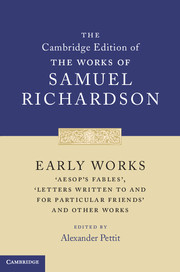Book contents
- Frontmatter
- Dedication
- Contents
- General Editors’ Preface
- Acknowledgements
- Chronology
- List of Abbreviations
- General Introduction
- Textual Introduction
- The Apprentice’s Vade Mecum (1733)
- A Seasonable Examination of the Pleas and Pretensions (1735)
- Preface to Aubin, A Collection of Entertaining Histories and Novels (1739)
- Aesop’s Fables (1739)
- Letters Written to and for Particular Friends (1741)
- Six Original Letters Upon Duelling (1765)
- Appendix: The Infidel Convicted (1731)
- Postscript
- Emendations
- Word-division
- Bibliographical Descriptions of Early Editions
- Explanatory Notes
- Index
Letter CXLI
Published online by Cambridge University Press: 30 June 2022
- Frontmatter
- Dedication
- Contents
- General Editors’ Preface
- Acknowledgements
- Chronology
- List of Abbreviations
- General Introduction
- Textual Introduction
- The Apprentice’s Vade Mecum (1733)
- A Seasonable Examination of the Pleas and Pretensions (1735)
- Preface to Aubin, A Collection of Entertaining Histories and Novels (1739)
- Aesop’s Fables (1739)
- Letters Written to and for Particular Friends (1741)
- Six Original Letters Upon Duelling (1765)
- Appendix: The Infidel Convicted (1731)
- Postscript
- Emendations
- Word-division
- Bibliographical Descriptions of Early Editions
- Explanatory Notes
- Index
Summary
The same Subject pursued.
SIR,
I will now take the Liberty to continue my Subject, andmy humble Expostulations upon it: And Iwill suppose two Cases very, if not equally probable; to wit, that you may, or may not, have Children by your new Lady; and to judge in both Cases, how the Happiness of your remaining Life may be affected by either. In the first place, if you should have Children by her, (to say nothing of the Misunderstandings and Jealousies this may create between your Lady, and your present Children, which may greatly affect your own Happiness) are you so well able to support, at these Years, with Credit and Satisfaction, that Character which so peculiarly befits a youngHusband to a young Wife? And will it not naturally strike you, that your own Children by that time will make a better Figure in such a Circumstance than yourself ? Will you be so well able to go thro’ the same Troubles, the same Anxieties, the same Hopes, Fears, and Affections, both to the pregnant Mother, and afterwards to the Infant Progeny, that you have so happily got over? And will not what was then called laudable Love, be now deemed Dotage and Uxoriousness?
Providence seems to have design’d the youthful Portion of a Man's Life, for mutual Endearments, and Propagation of his Family; the maturer Part, for Education, Counsel or Advice. And will you, Sir, invert the Design of it? Will you call back the Days of Sense, into the Years of Intellect; watch over the Baby in the Cradle, when you should form the Mind of the grown Person?——Howunequal will you be to this Part, to what you once were?— As you will not have the same Dispositions about you, you cannot have the same Joy at a pleasing Incident; but will have possibly a superadded Weight of Sorrow on any sad Event, as Years will have added to your Reflection, as Experience will have contracted your Hope, and as you will have seen the Vanity of all worldly Expectations.
Then, my dear Sir, consider, if you should even get over this resumed Province happily, and have no material Uneasiness from the Lady, on the Account I have intimated to you: Is it not too probable, that you may not live to see this young Race brought up?
- Type
- Chapter
- Information
- Early Works'Aesop's Fables', 'Letters Written to and for Particular Friends' and Other Works, pp. 466 - 468Publisher: Cambridge University PressPrint publication year: 2011

